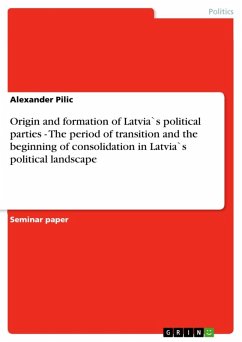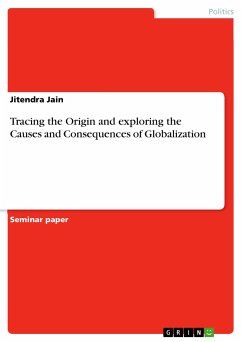Seminar paper from the year 2000 in the subject Politics - International Politics - Region: Eastern Europe, grade: 1,5 (A), Free University of Berlin (Otto Suhr Institute), language: English, abstract: After a short period of being a liberal democracy in the 1920¿s, Latvia was ruled by totalitarian regimes, beginning with the dictatorship of Ulmanis and the following German occupation of the country to almost fifty years of Soviet rule which ended officially on September 6th, 1991 when the Soviet Union recognized all three Baltic states as independent. In the aftermath, Latvia found itself in a process of transition which lasts for one decade now.When the people of Latvia were able to participate in the first partly free elections in 1989 they chose almost exclusively candidates of their main opposition movement Popular Front (LTF) to represent Latviäs interests within Moscow¿s Congress of the People¿s Deputies. Just one year later, the last elections under Soviet rule took place on the national level in Latvia. The Popular Front finished first and governed Latvia on it¿s way towards independence. As soon as the LTF was freed from the big pressure under which it had fought for democracy against the powerful Kremlin it became obvious that the Popular Front consisted of very different political groups ranging from former communist party members to Latvian nationalists. Some parties were very popular during one election, but in the next one they could not collect enough votes to get into parliament. Some parties collapsed after a short period of time, others split into new movements or merged with other parties. No coalition-government lasted for the whole parliamentary term and in each of the three elections during the nineties more than one half of the participating parties took part for the first time. On the other hand, especially during the last two years some small parties merged into larger ones or at least formed joined factions in parliament and lists in the elections. This development could be considered as a step towards larger and more significant parties which would lead to more stability within Latviäs political landscape. In order to find out whether there is a tendency for consolidation among political parties I will concentrate this essay in first place on their process of formation since the beginning of Latviäs democratization in the late eighties. Furthermore, I will link the parties¿ genesis with their roles in parliament and administration to explain their significance for Latvian politics. In my conclusion I will summarize the collected data in order to give an answer to the examined issue.
Dieser Download kann aus rechtlichen Gründen nur mit Rechnungsadresse in A, B, BG, CY, CZ, D, DK, EW, E, FIN, F, GR, HR, H, IRL, I, LT, L, LR, M, NL, PL, P, R, S, SLO, SK ausgeliefert werden.









